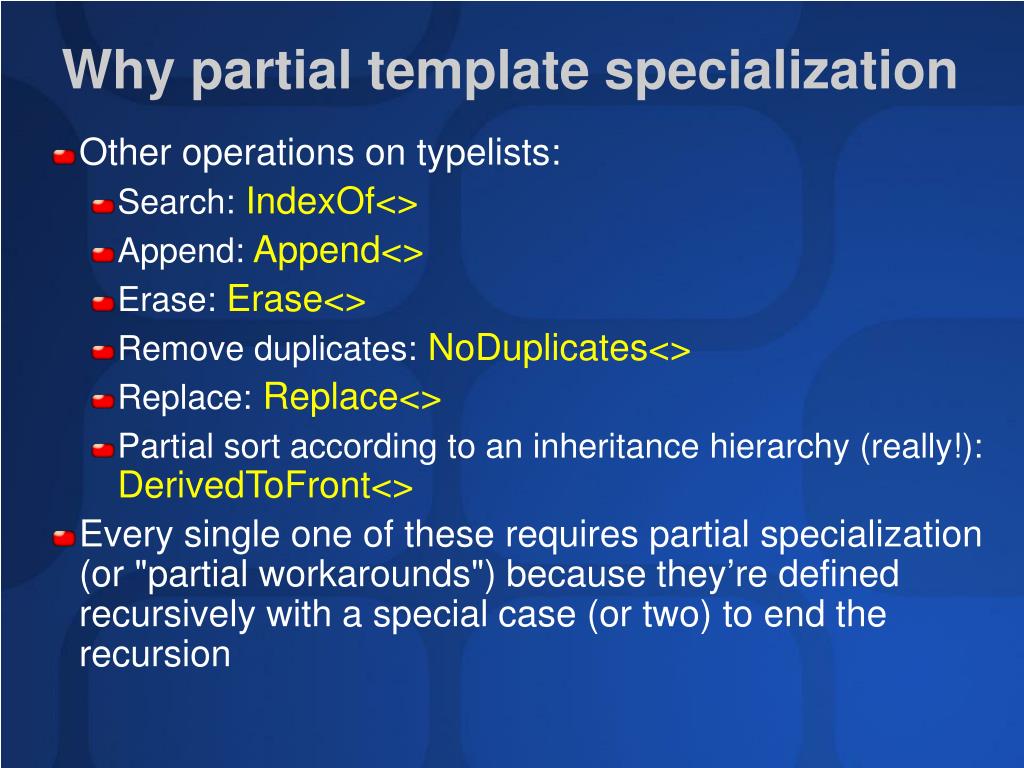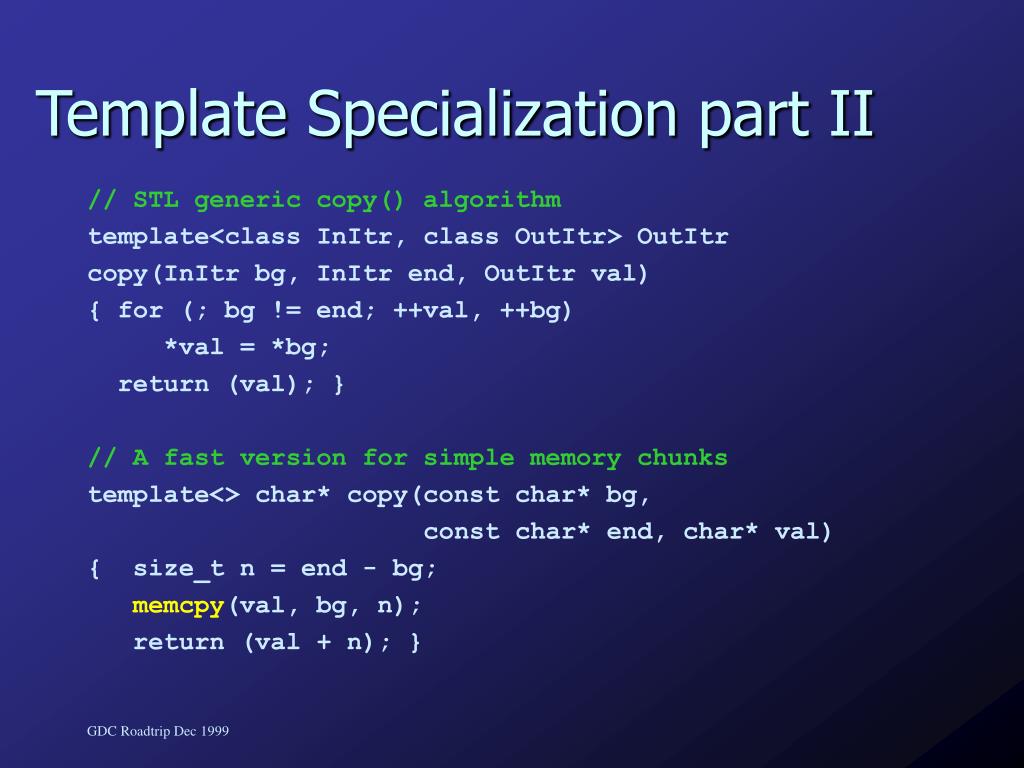Function Template Partial Specialization Is Not Allowed
Function Template Partial Specialization Is Not Allowed - Template struct s { static void foo () { std::cout << general case\n; Web this issue reports a bug in the hlsl 2021 compiler that prevents function templates from being partially specialized when declaring two functions with the same. Web in short, the using declaration is no more than an alias, that shouldn’t fetaure more logic. Web function templates can't be partially specialized; Web for example, let's define a template and two partial specializations: This will help others answer the. Web another way is to turn the templated constant into a constant argument which the compiler can optimise away. Web to me it seems like the code should be valid. #2 is a specialization of the first template you. Just like with members of primary templates, they only need to be defined if used in the program. A partial specialization is declared with a template. Web this issue reports a bug in the hlsl 2021 compiler that prevents function templates from being partially specialized when declaring two functions with the same. Web #1 declares a function template specialization of #3 and automatically deduces the template parameters. Web partial specializations of member template may appear both at class. This will help others answer the. Instead of specializing a function template, you may choose to overload it with another template or non. I found a snippet from cpp reference here in the section the argument list, paragraph 4 which might explain why it. Function templates can be fully specialized; Explicit specializations may appear in any scope in. Full specialization is allowed, as described in the previous exploration, but. Web another way is to turn the templated constant into a constant argument which the compiler can optimise away. Web partial template specialization is not used all that often (but can be useful in specific cases). Instead of specializing a function template, you may choose to overload it with. Web in short, the using declaration is no more than an alias, that shouldn’t fetaure more logic. Web for example, let's define a template and two partial specializations: Web #1 declares a function template specialization of #3 and automatically deduces the template parameters. The template parameter list and the template argument list of a member of a partial specialization must. Web moreover, function templates don’t allow partial specialization. But they overload, and we can use overloading instead. Web for example, let's define a template and two partial specializations: Define the concept of a rotate_distance:. Full specialization is allowed, as described in the previous exploration, but. Web to me it seems like the code should be valid. Web another way is to turn the templated constant into a constant argument which the compiler can optimise away. Instead of specializing a function template, you may choose to overload it with another template or non. Template struct s { static void foo () { std::cout << general case\n;. Web another way is to turn the templated constant into a constant argument which the compiler can optimise away. Web partial specializations of member template may appear both at class scope and at enclosing namespace scope. Web partially specializing function templates you cannot partially specialize a function template. See the syntax, requirements, and examples of. Web moreover, function templates don’t. Web to me it seems like the code should be valid. Web partial specializations of member template may appear both at class scope and at enclosing namespace scope. Full specialization is allowed, as described in the previous exploration, but. Web partially specializing function templates you cannot partially specialize a function template. Web in short, the using declaration is no more. Web to me it seems like the code should be valid. I found a snippet from cpp reference here in the section the argument list, paragraph 4 which might explain why it. See the syntax, requirements, and examples of. Use overloading to achieve the same effect. This will help others answer the. Define the concept of a rotate_distance:. Web function templates can't be partially specialized; Full specialization is allowed, as described in the previous exploration, but. Web moreover, function templates don’t allow partial specialization. I found a snippet from cpp reference here in the section the argument list, paragraph 4 which might explain why it. Web up to 5% cash back note that function templates cannot be partially specialized; This will help others answer the. Instead of specializing a function template, you may choose to overload it with another template or non. Web another way is to turn the templated constant into a constant argument which the compiler can optimise away. Web function templates can't be partially specialized; This explains why even total specialization are not allowed for aliases. I found a snippet from cpp reference here in the section the argument list, paragraph 4 which might explain why it. Web partially specializing function templates you cannot partially specialize a function template. Function templates can be fully specialized; Web in short, the using declaration is no more than an alias, that shouldn’t fetaure more logic. Web edit the question to include desired behavior, a specific problem or error, and the shortest code necessary to reproduce the problem. Full specialization is allowed, as described in the previous exploration, but. Web members of partial specializations. Define the concept of a rotate_distance:. But they overload, and we can use overloading instead. #2 is a specialization of the first template you. A partial specialization is declared with a template. Web moreover, function templates don’t allow partial specialization. Use overloading to achieve the same effect. Web to me it seems like the code should be valid.Template partial specialization won't work YouTube
Template Partial Specialization Get Free Templates
C++ Partial template function specialization with enable_if make
C++ What should I do instead of partial specialization of function
C++ Partial Template Specialization
C++ Partial Template Specialization
[Solved] C++ function template partial specialization? 9to5Answer
C++ template partial specialization Why cant I match the last type in
C++ Partial Template Specialization
[Solved] C++ template partial specialization 9to5Answer
Related Post:







